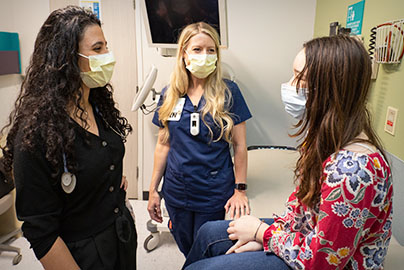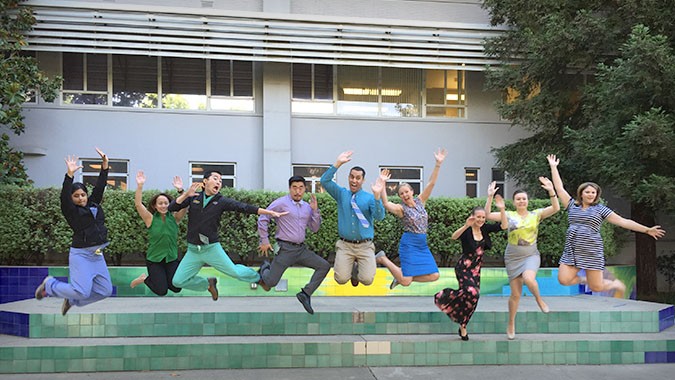Pediatric Residency Program
CHAANJE (Child Health Advocacy, Antiracism, Neighborhood Partnership, Justice and Equity) Lives Initiative
Developing Physician Leaders and Advocates for Pediatric Health Equity and Social Justice to Improve Child Health Disparities and CHAANJE Lives.
As the UC Davis Pediatric Residency Program, we recognize that the health of our children today directly impacts the strength of our future. Child Health Equity is a fundamental requirement to ensure the healthy growth, development, and wellness of our youth.
Key childhood determinants of health undisputedly influence core developmental experiences of our pediatric, adolescent, and young adult populations. These experiences, in turn, contribute to healthcare disparities that have the potential to alter health outcomes over a lifetime.
As a pediatric residency, we are dedicated to training our residents to be skilled, competent, and compassionate leaders in improving health outcomes through the areas of:
- Child and Community Health Advocacy
- Social Justice and Antiracism in Medicine
- Neighborhood Partnership
- Pediatric, Adolescent, and Young Adult Health Equity
The CHAANJE Lives Initiative created by the UC Davis Pediatric Program is a 3-year threaded curriculum aimed at training resident leaders and developing physician experts in these areas. Content is integrated throughout core didactics and experiential learning through a required 1 month community health and advocacy rotation, providing health care to vulnerable youth, scholarly project in community health advocacy, and legislative and media advocacy opportunities.
| Threaded Curriculum | |||||
|---|---|---|---|---|---|
| Grand Rounds | M&M | Morning Report | Social Justice Journal Club | Multidisciplinary Conferences | Case Management |
| Monthly Didactics | |||||
| Sacramento through the lens of Child Health Equity | Equity based Root Cause Analysis | Child Health and Well-Being Inequities – Local, Regional, National, International | Special Populations | Next Steps – Identify strategies to overcome barriers to participation in community health initiatives after graduation | |
| Experiential Learning Opportunities | |||||
| 4 weeks required Community Health Advocacy rotation as PGY1 | Provide health care to vulnerable populations | Partner with Communities on Scholarly Project in Community Health / Advocacy | Legislative advocacy | Media advocacy (op eds, podcast, video) | |
PGY1 Course Work
-

One month intensive and interactive rotation focused on the impacts of adverse childhood experiences, social determinants of health and ways residents can address health inequities through advocacy and their clinical practice.
-

Vulnerable Patient Populations/Intersections
- Juvenile Justice Informed Youth
- Chronic illness
PGY1 Didactics
-
Sacramento 101: An introduction to the Sacramento Community through the lens of child health equity.
-
Social Justice Frameworks/Critical Consciousness Perspectives
-
Introduction to Equity Based Skillsets:
- Social Determinants of Health
- Equity-Based Root Cause Analysis (quarterly around patient presentation)
- At the level of the patient
- Can align with journal club or narrative reflection.
- Analyze common child health and well-being inequities through our patient interactions considering the examination of child health disparities and opportunities of physician advocacy.
- At the level of the patient
- Framing Child Health and Well-Being Issues (Biannually)
- Apply Frameworks to effectively change public discourse about child health and well-being issues
-
Special Populations / Topical Issues: Interest driven reflection concentrating on health and well-being outcomes among children and adolescents from marginalized and/or vulnerable backgrounds
-
Child Health Equity Journal Club: Evaluation of current literature addressing child, adolescent, and young adult health equity as well as social justice, population health, and antiracism in medicine.
- Sacramento 101 – Changes and Updates
- Expansion of Skill Sets
- Sacramento/California Health Disparities: Equity-Based Root Cause Analysis:
- Analyze common child health and well-being inequities in Sacramento through the examination of child health disparities and opportunities of physician advocacy.
- Framing Child Health and Well-Being Issues (Biannually)
- Apply Frameworks to effectively change public discourse about child health and well-being issues
- Special Populations / Topical Issues: Interest driven reflection concentrating on health and well-being outcomes among children and adolescents from marginalized and/or vulnerable backgrounds
- Child Health Equity Journal Club: Evaluation of current literature addressing child, adolescent, and young adult health equity as well as social justice, population health, and antiracism in medicine.
- Sacramento 101 – Changes and Updates
- Expansion of Skill Sets
- Sacramento/California Health Disparities: Equity-Based Root Cause Analysis:
- Analyze common child health and well-being inequities in our Nation through the examination of child health disparities and opportunities of physician advocacy.
- Framing Child Health and Well-Being Issues (Biannually)
- Apply Frameworks to effectively change public discourse about child health and well-being issues
- Special Populations / Topical Issues: Interest driven reflection concentrating on health and well-being outcomes among children and adolescents from marginalized and/or vulnerable backgrounds
- Child Health Equity Journal Club: Evaluation of current literature addressing child, adolescent, and young adult health equity as well as social justice, population health, and antiracism in medicine.
- Child Health and Well-being Inequities: A local, state, national and international perspective: Review child health outcomes at the local, state, national and international level.
- Residency is Ending, Now What? Annual session designed for graduating residents
- Reflection on Training and Experiences Over the Past 3 Years
- Identification of experienced or perceived future barriers to physician participation in community health initiatives
- Review and discussion of opportunities to partner with future communities after residency
- Framing Child Health and Well-Being Issues: Apply Frameworks to effectively change public discourse about child health and well-being issues.
- Special Populations / Topical Issues: Interest driven reflection concentrating on health and well-being outcomes among children and adolescents from marginalized and/or vulnerable backgrounds.
- Child Health Equity Journal Club: Evaluation of current literature addressing child, adolescent, and young adult health equity as well as social justice, population health, and antiracism in medicine.
Threaded Health Equity / Social Justice Curriculum: The attainment of expertise in areas influencing pediatric health equity cannot be gained in silos or isolation. For this reason, these core topics are threaded throughout the resident curriculum, including our core didactic conferences (Case Management, M&M, Multidisciplinary Conference, Grand Rounds, Morning Report), and opportunities for scholarly activity, media advocacy, legislative advocacy, and community engagement. Residents are encouraged to stay up to date with current Child Health Equity Literature through Child Health Equity Journal Clubs and have access to an up to date Child Health Equity Virtual Library.
CHAANJE Lives Curriculum Director
-
Laura Kester Prakash, M.D., M.P.H.
As an adolescent medicine sub-specialist, Dr. Laura Kester Prakash is deeply passionate about the care and health of her adolescent and young adult patients. Adolescence is a period of substantial physical, psychological, cognitive, and moral development. During this time of significant transition where young people grow, discover, and experience new and exciting, and also face very challenging experiences, Dr. Kester Prakash believes in developing personalized care plans that are tailored to her patients' physical, psychological, social, and developmental needs. Dr. Kester Prakash is dedicated to working with her patients to ensure they are building health behaviors that promote them transitioning into thriving and resilient young adults.

Contact Information
Residency Training Program
Department of Pediatrics, UC Davis Health
2516 Stockton Boulevard
Sacramento, CA 95817
Phone: 916-734-2428
Email: pedsresidency@health.ucdavis.edu

